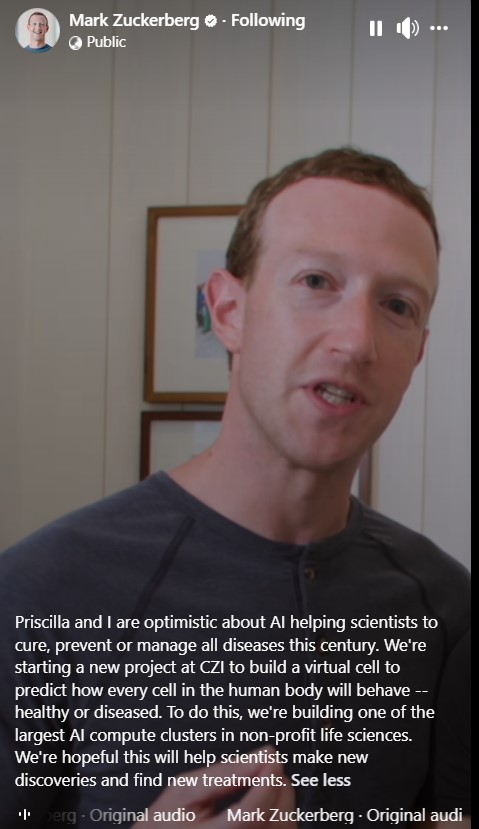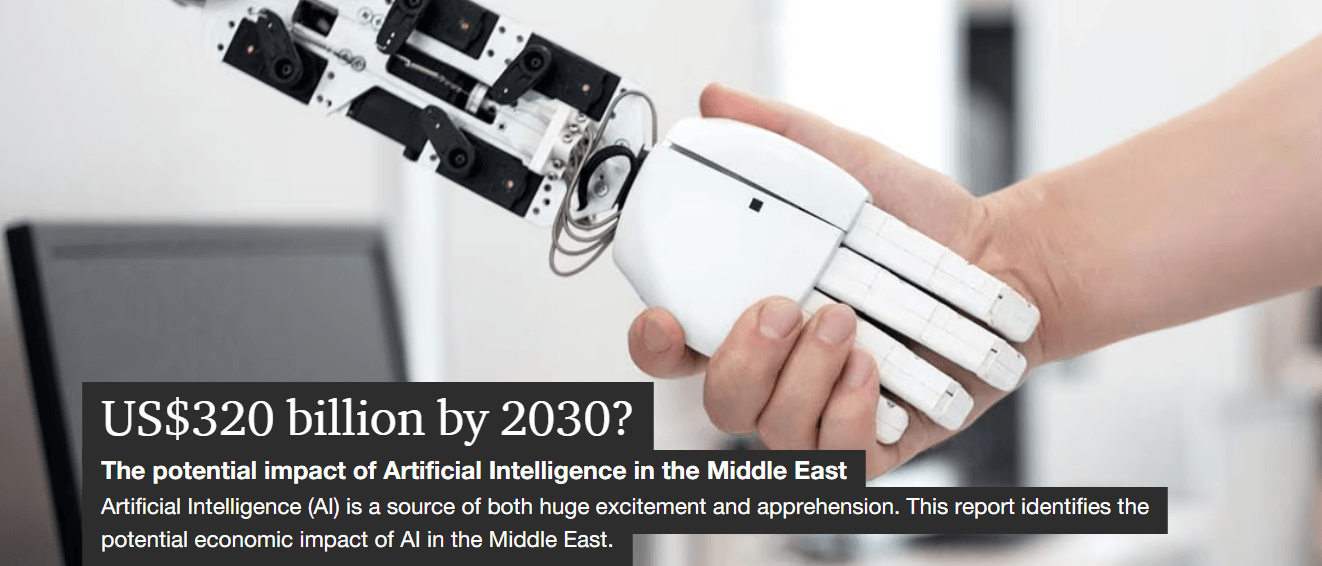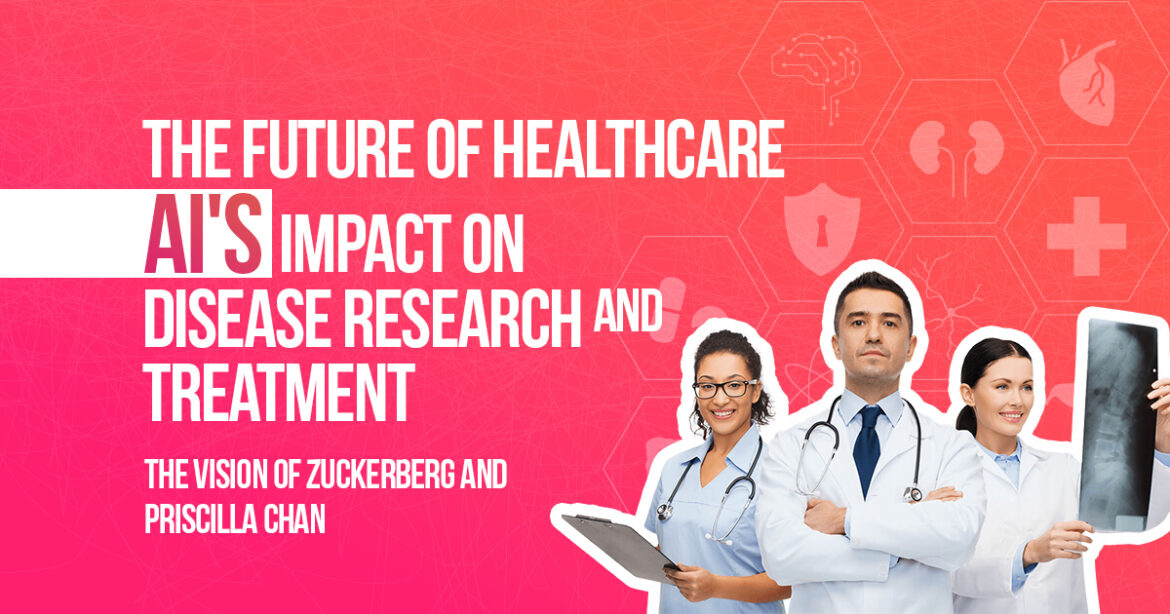Table of Contents
Imagine a world where diseases are a thing of the past, where scientists can predict and prevent illnesses before they occur. This is the inspiring vision that Priscilla Chan and Mark Zuckerberg hold for the future of healthcare, and they are actively working to turn this vision into reality.
Through the Chan Zuckerberg Initiative (CZI), they have recently initiated a groundbreaking project aimed at constructing a virtual cell capable of predicting the behavior of every human cell, whether healthy or diseased. This ambitious undertaking exemplifies how artificial intelligence (AI) is driving revolutionary advancements in disease research and treatment.
The Virtual Cell Project

The virtual cell project, led by the Chan Zuckerberg Initiative, represents an unprecedented endeavor to map the cellular activity within the human body comprehensively. Harnessing AI algorithms to analyze vast datasets, scientists are poised to anticipate how cells will respond in diverse scenarios, including both health and disease.
The insights garnered from this endeavor will be pivotal in developing innovative treatments and therapies, potentially curing or preventing various diseases. CZI is taking monumental steps by establishing one of the largest AI compute clusters in non-profit life sciences, empowering researchers to process immense data volumes and execute complex simulations that were once deemed unattainable. This project marks a significant advancement in the battle against diseases, holding the potential to save countless lives.
How AI is Revolutionizing Disease Research
AI is currently reshaping the landscape of healthcare, including the domain of disease research. Machine learning algorithms have the capability to analyze extensive datasets, uncover patterns, and make predictions that surpass human capacity. The global healthcare artificial intelligence market is projected to reach an astounding $67.8 billion by 2025, as reported by Grand View Research, underscoring the rapid growth in this sector.
One notable application of AI is in the analysis of medical imaging, such as MRIs and CT scans, to detect early signs of disease. This early detection translates into more effective treatments and improved patient outcomes.
AI also plays a pivotal role in drug discovery, mining vast data sources to pinpoint potential drug targets and develop novel treatments. Moreover, AI’s potential is fully realized in personalized medicine, tailoring treatment plans based on individual genetic data, medical histories, and other factors. This approach enhances treatment effectiveness while reducing side effects.
Table 1: AI Applications in Healthcare
| AI Application | Description |
| 1. Predictive analytics | AI algorithms are used to analyze large datasets and predict patient outcomes, such as the likelihood of disease progression or response to treatment. |
| 2. Medical imaging analysis | AI algorithms are used to analyze medical images, such as X-rays and MRIs, to identify patterns and abnormalities. |
| 3. Drug discovery | AI algorithms are used to analyze large amounts of data to identify potential drug targets and develop new drugs. |
| 4. Personalized medicine | AI are tailored in treatment plans to individual patients based on their genetic data, medical history, and other factors. |
| 5. Electronic health records (EHRs) | AI used to analyze EHRs to identify patterns and trends in patient data, improving patient care and population health. |
Table 2: Benefits of AI in Healthcare
| Benefit | Description |
| 1. Improved patient outcomes | identifying potential health issues earlier and providing personalized treatment plans. |
| 2. Increased efficiency | It can help in streamline clinical workflows and reduce administrative tasks, freeing up time for healthcare professionals to focus on patient care. |
| 3. Enhanced patient experience | improve patient engagement and satisfaction by providing personalized communication and support. |
| 4. Reduced costs | It can reduce healthcare costs by identifying potential health issues earlier, reducing the need for costly interventions and hospitalizations. |
| 5. Increased access to care | AI can help increase access to healthcare services for underserved populations by providing remote monitoring and consultation services. |
Table 3: Challenges of AI in Healthcare
| Challenge | Description |
| 1. Data quality and availability | AI algorithms require high-quality and abundant data to make accurate predictions and decisions. |
| 2. Privacy and security | AI algorithms require access to sensitive patient data, which raises concerns about privacy and security. |
| 3. Regulatory and ethical issues | AI raises a range of regulatory and ethical issues, such as ensuring transparency and accountability in decision-making. |
| 4. Clinical validation | AI algorithms must be clinically validated to ensure that they are safe and effective for use in patient care. |
| 5. Integration into clinical workflows | AI algorithms must be integrated into clinical workflows to ensure seamless use by healthcare professionals. |
Table 4: AI Technologies Used in Healthcare
| Machine learning | Machine learning algorithms are used to analyze large datasets and make predictions or decisions. |
| 2. Natural language processing | Natural language processing algorithms are used to analyze and generate human language, improving patient communication and clinical workflows. |
| 3. Computer vision | Computer vision algorithms are used to analyze medical images, such as X-rays and MRIs, to identify patterns and abnormalities. |
| 4. Robotics | Robotics algorithms are used to develop robots that can perform tasks such as surgery and patient monitoring. |
| 5. Predictive modeling | Predictive modeling algorithms are used to forecast patient outcomes and identify potential health issues. |
Table 5: AI Companies in Healthcare
| Company | Description |
| 1. IBM Watson Health | IBM Watson Health offers a range of AI solutions for healthcare, including predictive analytics and medical imaging analysis. |
| 2. DeepMind Health | DeepMind Health is a UK-based AI company that develops AI algorithms for healthcare, including predictive analytics and medical imaging analysis. |
| 3. Optum | Optum is a US-based healthcare company that offers AI solutions for healthcare, including predictive analytics and personalized medicine. |
| 4. Medtronic | Medtronic is a US-based medical device company that develops AI-powered devices, such as pacem |
The Future of Healthcare
The prospects of AI revolutionizing disease research and treatment are truly transformative. With AI’s aid, scientists can make unprecedented discoveries and develop novel treatments previously unimaginable. The virtual cell project serves as a mere prelude to the potential of AI in healthcare. Looking ahead, AI will likely be instrumental in predicting and preventing diseases before they manifest. AI-driven systems can assist healthcare professionals in identifying individuals at risk of conditions like diabetes or heart disease, offering preventive measures. Notably, a McKinsey report indicates that AI applications in healthcare could potentially yield annual savings of up to $150 billion in the United States alone.
AI will continue to make significant strides in medical imaging, ensuring timely identification and treatment of health issues. In conclusion, the future of healthcare is incredibly promising, with AI leading the way. The ambitious vision of Priscilla Chan and Mark Zuckerberg is increasingly achievable, with AI driving innovation and transformation in healthcare.
Ai in Healthcare and Its Implications in the Middle East

In the Middle East, the adoption of AI in healthcare carries profound implications and immense promise. As the region invests in cutting-edge technology and innovation, AI emerges as a potent tool to address pressing healthcare challenges. With a burgeoning population and growing healthcare demands, AI is pivotal in enhancing disease prevention, diagnosis, and treatment. AI-driven predictive models, for instance, can identify individuals at risk of prevalent diseases, such as diabetes and cardiovascular conditions, allowing for early interventions. A report by PwC Middle East projects that by 2030, the implementation of AI in healthcare across the region could generate cost savings of up to $22 billion, signifying substantial economic impact. Additionally, the adoption of AI-powered telemedicine solutions can bridge geographical disparities, ensuring healthcare accessibility for underserved areas. The Middle East is strategically positioning itself to harness AI’s potential, aiming to bolster healthcare outcomes, reduce costs, and ultimately foster a healthier and more prosperous future for its population.
Conclusion
The future of healthcare is exciting, and AI plays a significant role in revolutionizing disease research and treatment. The virtual cell project is just one example of how AI can be used to make a positive impact on human health. With the help of AI, scientists can make new discoveries, develop new treatments, and optimize existing ones.
The potential for AI to revolutionize healthcare is enormous, and we’re just beginning to scratch the surface. As AI technology advances, we can expect to see even more innovative applications in the healthcare field.
Priscilla Chan and Mark Zuckerberg’s vision of a world where diseases are a thing of the past may seem ambitious, but with the help of AI, it’s a vision that’s within reach. The future of healthcare is bright, and AI is leading the way.

